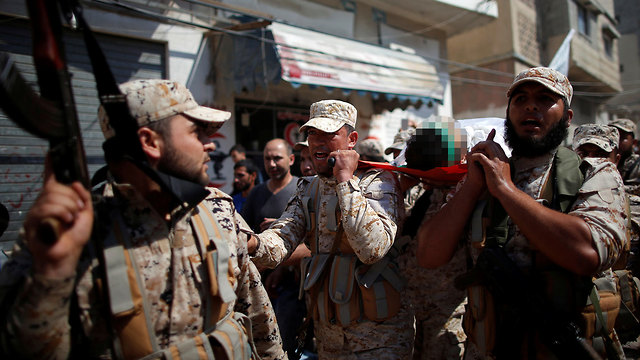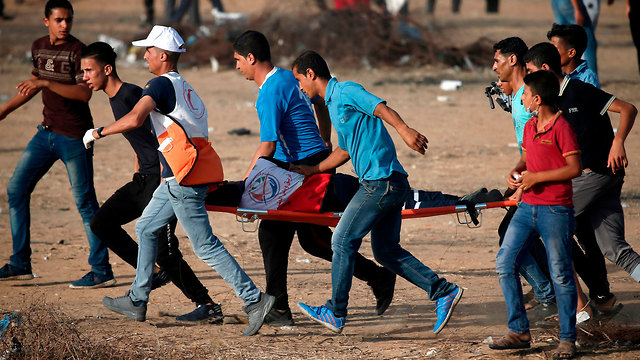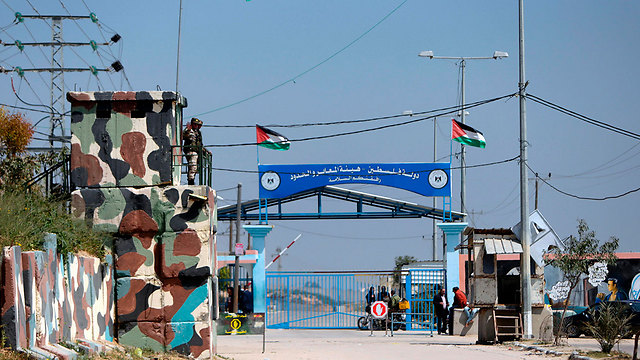

As Hamas shows restraint, security officials discuss allowing 5,000 Gazan workers into Israel
'They'll have something to lose, they won't go off and burn the fields in which they work,' says security officials; quiet negotiations also evident in changes to IDF protocol for opening fires, which exclude 'Hamas' restraint forces' who walk around armed and undisturbed when they engage in riot dispersal near border fence
Hamas' decision to launch two rockets into Israel, rather than firing a larger barrage or starting border-fence riots, is considered minor in comparison to earlier events.
Changes in Israeli policy are also evident in modification to the IDF's protocol for opening fire.
Up until this year, every armed individual identified between 100-300 meters from the border fence with Israel was to be shot immediately, while now, orders have been changed to exclude "Hamas' restraint forces" who can walk armed and undisturbed near the border-fence if they engage in dispersing Palestinians from the fence.
In cases when such forces approach the fence, orders call for an arrest procedure rather than an order to fire.
These newly established trust and coordination procedures are not likely to include direct communication between the two sides, as IDF and their the West Bank have during riots there. But could be evidence for Hamas and Israel quietly working to maintain a long term arrangement.
Another meaningful step in this arrangement that is now being debated is allowing 5,000 Gazans, to work in agriculture and construction in Israeli Gaza border communities.
Palestinians from the West Bank with work permits already work in construction in the city of Sderot, several kilometers from Gaza, while Gazan Palestinians have been barred from working in Israel since the 2005 detachment.
"It's cheaper than paying Thai workers," said a security official who supports the move. "They won't have to sleep inside Israel, and most importantly, they'll have something to lose, they won't go off and burn the field in which they work."
However, the Shin Bet is still reluctant to support such a move, despite COGAT and IDF support.
"In Gaza, people will choose working in Israel over digging terror tunnels," the security official said. "Each of the 5,000 will be thoroughly checked on his way in and out of the Strip and will earn about NIS 3,500 in comparison to about NIS 1,000 he can make inside Gaza — if his lucky and has a job there."
"We're talking about more than NIS 25 million each month, that will allow workers to purchase products in Gaza and improve the economic situation there, which will in turn bring calm," he added.
"Any flare-up will of course mean the closing of the border. But today they are in a spot where they have nothing to lose."
The Shin Bet rejects such an arrangement since unlike in the West Bank, Israel has no presence inside the Strip, and thus can't make immediate arrests of terror suspects if it needs to.
It presented state officials with recent cases in which Hamas took advantage of sick Gazans who entered Israel for treatment and sent them into the West Bank to deliver information, funds or weaponry for terror purposes.
The Shin Bet fears that Hamas could send workers on similar missions inside border fence communities so they can to gather information on IDF patrols, school schedules and similar sensitive information.
Furthermore, Hamas rules the Gazan side of the border cross points into Israel, while in the West Bank it is operated by PA forces with whom the IDF has cooperation. This would make security checks on workers leaving and entering the Strip far more difficult.


















